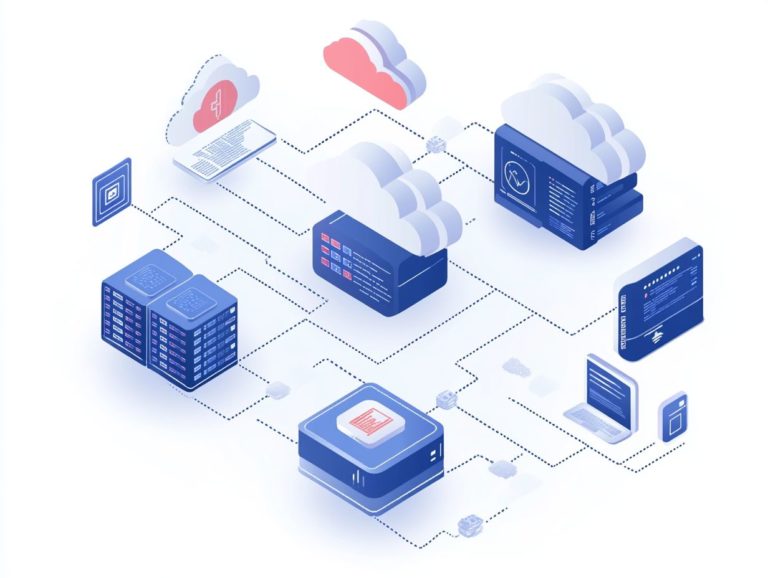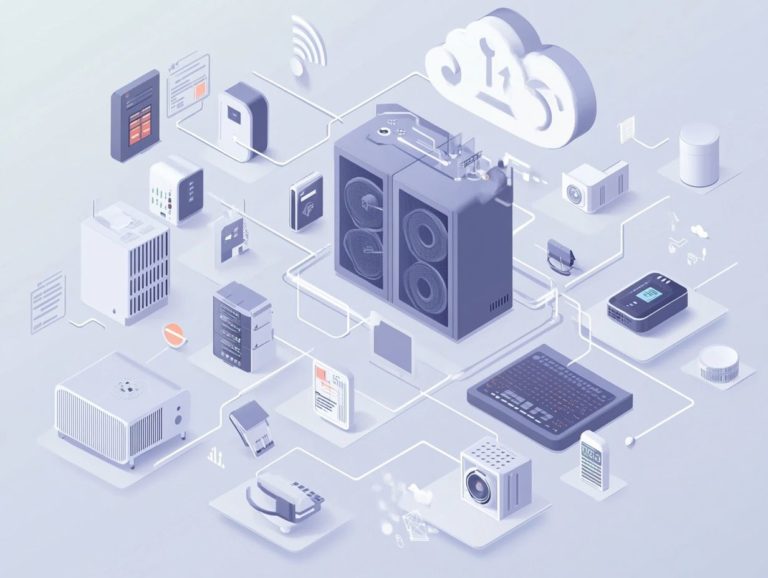The Future of Hybrid Cloud Solutions
In today s fast-paced digital landscape, hybrid cloud solutions are becoming a compelling choice for those looking to strike the perfect balance between flexibility and control over data.
This article delves into the essence of hybrid cloud technology, breaking down its key components and highlighting the significant benefits it offers, such as cost efficiency and scalability. Yet, it s not all smooth sailing; challenges like integration issues and security concerns do exist.
You ll also get a glimpse into future trends and discover practical tips for selecting the right hybrid cloud solution tailored specifically to your organization’s needs.
Dive into this topic and see how hybrid cloud can revolutionize your business operations!
Contents
- Key Takeaways:
- Understanding Hybrid Cloud Solutions
- Benefits of Hybrid Cloud Solutions
- Challenges of Implementing Hybrid Cloud Solutions
- Future Trends in Hybrid Cloud Solutions
- How to Choose the Right Hybrid Cloud Solution
- Frequently Asked Questions
- What is the future of hybrid cloud solutions?
- What are the key benefits of hybrid cloud solutions?
- How is the adoption of hybrid cloud solutions expected to grow in the future?
- What challenges may arise in the future for hybrid cloud solutions?
- How can hybrid cloud solutions help businesses in their digital transformation journey?
- What role will automation and artificial intelligence play in the future of hybrid cloud solutions?
Key Takeaways:

Hybrid cloud solutions offer a cost-efficient and scalable option for businesses looking to optimize their cloud capabilities. Integration and security concerns are key challenges, but advancements in technology and industry adoption are expected to drive future growth. Consider your data storage needs and deployment models when selecting a hybrid cloud solution, and implement it with the guidance of experienced professionals.
Understanding Hybrid Cloud Solutions
Hybrid cloud solutions offer a transformative approach that seamlessly integrates multiple cloud environments, enabling you to leverage the strengths of both public and private clouds.
This model enhances your operational efficiency while tackling the complexities of enterprise applications. It helps you integrate on-premises data centers with leading cloud providers like Amazon Web Services, Microsoft Azure, and Google Cloud.
Furthermore, this model helps you meet the changing demands of customer experience while harnessing cutting-edge technologies like edge computing for optimal performance.
Definition and Key Components
Hybrid cloud solutions offer a smart combination of public and private clouds, enabling you to deploy cloud-native applications while efficiently managing workloads and maintaining robust network connectivity.
This architecture allows you to tailor your cloud strategies by harnessing the scalability of public resources alongside the security and control provided by private infrastructures.
Key components of hybrid cloud architecture include storage solutions that offer flexible data management options, compute resources that dynamically adjust according to demand, and a suite of security measures that ensure data protection across all environments. You might also consider adopting multi-cloud strategies to maximize agility and optimize resource management.
By making strategic investments in technology, you can enhance performance, enabling your organization to respond swiftly to market changes and innovate without sacrificing security or compliance.
Benefits of Hybrid Cloud Solutions
The benefits of hybrid cloud solutions are numerous, providing you with substantial advantages in cost optimization, scalability, and heightened business value.
With these solutions, you must enhance your disaster recovery capabilities now to stay competitive and facilitate seamless cloud migrations, positioning your organization for greater success.
Cost Efficiency and Scalability

Cost efficiency in hybrid cloud solutions comes down to optimized resource management, allowing you to scale your cloud infrastructure in line with demand while keeping operational overhead to a minimum.
By leveraging a variety of deployment strategies be it public, private, or multi-cloud configurations you can selectively allocate resources, ensuring you only pay for what you actually use.
This level of adaptability not only enhances your ability to respond to fluctuating workloads but also significantly cuts down on costs related to over-provisioning.
Integrating advanced technologies from reputable vendors like Cisco and VMware can streamline your operational processes, ensuring seamless connectivity and heightened performance.
These partnerships provide you with tools that automate scaling, foster collaboration, and ultimately lead to improved service delivery. This makes hybrid cloud solutions an appealing choice for those looking to achieve both efficiency and growth.
Challenges of Implementing Hybrid Cloud Solutions
While hybrid cloud solutions present numerous advantages, navigating the associated challenges is essential.
These challenges include integration complexities, security concerns, and organizational hurdles, especially regarding regulatory compliance.
Integration and Security Concerns
Integration and security are critical factors to address when deploying hybrid cloud solutions. Managing multiple environments creates complexities that require robust security measures.
You can navigate these complexities by adopting various integration strategies that promote seamless operations across both on-premises and cloud environments. This approach involves implementing standardized protocols and leveraging APIs to ensure smooth data flow and interoperability.
Prioritizing security measures is essential for safeguarding sensitive information from emerging threats. Utilizing advanced technologies like artificial intelligence (AI) and machine learning (ML) can significantly enhance your security frameworks, enabling real-time anomaly detection and effective automated responses.
These technologies are also crucial for disaster recovery, allowing you to forecast potential disruptions and ensuring rapid recovery with minimal downtime.
Future Trends in Hybrid Cloud Solutions
The future of hybrid cloud solutions is characterized by rapid technological advancements and increased industry adoption, particularly in understanding the role of AI in hybrid cloud solutions.
This evolution is driven by the growing need for edge strategies and dynamic market trends that emphasize real-time data processing and enhanced responsiveness.
Technological Advancements and Industry Adoption

Technological advancements among cloud providers are driving the use of hybrid cloud solutions, paving the way for cloud-native applications that enhance operational efficiency across various sectors.
As you recognize the significance of seamless integration and scalability, cloud providers become essential partners in facilitating these transitions. This shift allows you to harness cutting-edge technologies, such as AI and ML, refining your decision-making processes and optimizing resource allocation.
Investing wisely in cloud-native applications today will unlock your potential for growth tomorrow. This strategy enables you to respond swiftly to market demands and customer needs, driving innovation and ensuring long-term sustainability in an ever-evolving digital landscape.
How to Choose the Right Hybrid Cloud Solution
Selecting the ideal hybrid cloud solution requires thoughtful evaluation of several key factors. Consider the cloud architecture, ensuring it aligns with your business goals, and account for your organization’s unique needs.
Each element plays a crucial role in establishing a robust and effective cloud strategy.
Factors to Consider and Tips for Implementation
When evaluating hybrid cloud solutions, carefully consider automation tools and deployment strategies that can significantly reduce your operational overhead while facilitating effective multi-cloud strategies.
By leveraging these innovative solutions, your organization can enhance its efficiency and adaptability in a rapidly evolving digital landscape. Automation tools like Terraform and Ansible enable you to define infrastructure as code, simplifying the management, deployment, and scaling of resources across multiple clouds.
Industry leaders emphasize the importance of continuous integration and continuous deployment (CI/CD) practices, which streamline your implementation process. Containerization strategies, particularly with Docker and Kubernetes, enhance application portability and consistency across various environments.
These practical insights illustrate how strategic deployment and automation can elevate your operational capabilities across multiple sectors.
Frequently Asked Questions
What is hybrid cloud?
Hybrid cloud is a computing environment that combines on-premises infrastructure, or a private cloud, with a public cloud, allowing data and applications to be shared between them.
What are the benefits of hybrid cloud solutions?
Benefits include increased flexibility, improved security, and optimized resource allocation, allowing organizations to tailor solutions to their specific needs.
How do I ensure regulatory compliance in a hybrid cloud environment?
To ensure compliance, regularly review your cloud provider s security measures and ensure they align with your industry regulations.
For more information on hybrid cloud solutions or assistance in selecting the right option for your organization, feel free to reach out!
What is the future of hybrid cloud solutions?

Exciting times lie ahead for hybrid cloud solutions! More businesses are embracing this model for their IT setup.
Hybrid clouds combine the benefits of both public and private environments. This creates more flexibility, scalability, and cost savings.
What are the key benefits of hybrid cloud solutions?
Hybrid cloud solutions offer many advantages. These include improved quick response times, cost savings, enhanced data security, and increased scalability.
They allow seamless integration of on-premises and cloud resources. This provides a unified environment for managing and deploying applications.
How is the adoption of hybrid cloud solutions expected to grow in the future?
Research predicts significant growth in the adoption of hybrid cloud solutions in the coming years. This is due to the rising demand for flexible and scalable IT infrastructure.
Advancements in cloud technologies make hybrid solutions more accessible and affordable.
What challenges may arise in the future for hybrid cloud solutions?
Challenges may arise for hybrid cloud solutions, including data security concerns and integration complexities.
There will also be a need for skilled IT professionals to manage and maintain the hybrid cloud environment.
How can hybrid cloud solutions help businesses in their digital transformation journey?
Hybrid cloud solutions play a crucial role in a business’s digital transformation. They provide the necessary infrastructure and tools to support innovation and quick responses.
These solutions help organizations modernize their IT systems and applications, improve collaboration, and gain a competitive edge.
What role will automation and artificial intelligence play in the future of hybrid cloud solutions?
The future of hybrid cloud solutions will likely see increased use of automation and artificial intelligence.
These technologies optimize processes, reduce costs, and improve efficiency. They also help manage the complex hybrid cloud environment and automate routine tasks.






